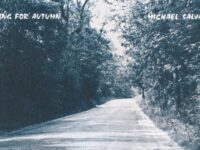Cary Heuchert‘s Hourglass is a dense and mostly acoustic singer-songwriter album that recalls the melodic and idiosyncratic music of the ’70s – the stuff that slipped into the import bins of hip record stores and usually had a pretty cool cover.
To the point: The press notes mention “the acoustic prog” of Pink Floyd, Kevin Ayres, Marc Bolen, and (holy cow!) Jim Pembroke of Finland’s finest band, Wigwam, and of course brilliant solo records.
Oh — to toss yet another alluring apple to the lovers of ’70s underground stuff, Le Orme keyboard player Tony Pagliuca plays on one track. Oh (with even more emphasis!) — I hear the tense vibe of Peter Hammill, circa In Camera with tunes like “Again” and “The Comet, the Course, the Tail.” And, there’s also an affinity with Ken Hensley, the Uriah Heep guy on his solo record Proud Words on a Dusty Shelf, in the more acoustic moments like “From Time to Time” and “Black Hearted Lady.”
For those readers who plug all these names into a directional Garmin when hunting for vinyl shops that are, thankfully, and to use another Biblical reference, resurrecting all over the place: Well, to (sort of) quote the Coca-Cola Company, “This record is for you!” For the novice who loves Bon Iver and is seeking the natural music of the collective universal soul, “This Coke’s for you, too!”
“This Is the Time” is simple beauty. Heuchert’s emotive voice pleads with rounded wisdom that states, “we are here now, now we are here.” And his acoustic guitar gently frames the existential message that would not have been out of place on the second side of Pink Floyd’s Meddle.
“The Sea of Faces” truly catches the beauty of Ken Hensley’s best solo stuff. Background voices and a spacey keyboard sound enhance the tune. Perhaps, a lucid Syd Barrett could have written this song. Hourglass continues with a (to quote the press release again) “semi-psychedelic aura.” “You Are the World to Me” has a simple melody that is enhanced by a dramatic piano and simpatico strings. Then, “Waiting for You” gets wobbly and throbs with an acid-folk ambience. This song just slows time in a wondrous way. The very pure and acoustic “From the Corner of My Eye” is a hushed moment of reflective love. Yes, a flute dances throughout the tune. Then, the quiet center of the record is the piano framed “Forever and So Far,” which mines the pathos of universal broken-hearted passion.
And, yes, it is time to mention (the great) Donovan — the guy who, perhaps, invented all this clever, honest-to-the-bone folk song stuff. He once sang the magical words, “first there is a mountain, then there is no mountain, then there is.” So, life’s a slowly paced circle. Sure. And, in his “Meet on the Ledge,” (the also very-great) Richard Thompson wrote the lovely line, “if you really mean it, it all comes round again.” Truly, Cary Heuchert’s music is the folk stuff that “all comes round again.”
As said, Hourglass definitely sings to those of us who loved singer-songwriters whose melodies and lyricism trolled deep waters. But young listeners, those who have discovered the beauty of introspective (primarily) acoustic music from the likes the before-mentioned Bon Iver, Jonathan Wilson and Ryley Walker, will find a lot to love in this album, which Cary Heuchert himself calls, “modern progressive Acoustic-cana.”
Elsewhere, “Together” rocks up a bit with a strident electric guitar that recalls the psych sound of Nick Saloman and his Bevis Frond in their lighter moments. Ditto for the bouncy “I Don’t Want to Say Goodnight to You,” which has the same classic and eternal rock ‘n’ roll slow bluesy pulse as John Lennon’s “Revolution.” It’s a nice pop tributary to the rest of the album.
The title tune, “Hourglass,” returns to the confessional and melodic acoustic mode — until it soars into the cosmos with a fiery electric guitar solo – before it spirals off into quiet infinity. Not to be redundant (as my high school students often made accusation of my teaching!) but this album contains the sublime songwriting of all those greats of the early ’70s, with emphasis on Hensley. That’s a big complement.
The final song, “When Fortune Smiles,” is a languid (with a lovely bass) that melodically questions (with existential uncertainty) “how we came to be” — all framed in that “semi-psychedelic aura.” It’s a carefree prayer to any universe that only gifts a boomerang answer of, to quote the very first tune, “this is the time” once more and says, “Here we are now, now we are here.”
It’s just an idea, but that’s pretty similar to Kurt Vonnegut’s Harmoniums, those “semi-sapient organisms” from his novel The Siren of Titan who live in the caves of the planet Mercury, and who utter the words: “Here I am,” and “So glad you are.” Now, not only is that a nice thing to say, but also echoes the free-thinking and quite peculiar vibe of Cary Heuchert’s Hourglass.
But, with added insight, Heuchert also sings: “The roots of our yesterday have brought us both here.” Of course, with these words, he links the past into the present. And, as Shakespeare wrote, “If music be the food of love, play on”; and that’s what Hourglass does: In its own melodic and idiosyncratic way, it, quite simply, glances at the beauty of the past, and then knows that symbolic folky “mountain” needs to be voiced once again – and thankfully, then, he just proceeds to “play on.”
- Nektar – ‘Journey to the Other Side: Live at the Dunellen Theater’ (2024) - April 8, 2024
- Emerson Lake and Powell – ‘The Complete Collection’ (2024) - February 23, 2024
- Madlen Keys – ‘Event Horizon’ (2023) - December 15, 2023




